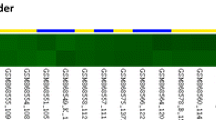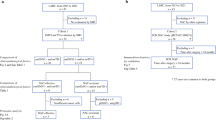Abstract
Locally advanced rectal cancers are currently treated with neoadjuvant concurrent chemoradiotherapy (CCRT) followed by surgery, but risk stratification and final outcomes remain suboptimal. In this study, we identify and validate targetable metabolic drivers relevant to the prognosis of patients with rectal cancer treated with CCRT. Using a published transcriptome of rectal cancers, we found that asparagine synthetase (ASNS) gene significantly predicted the response to CCRT. From 172 patients with rectal cancer, the expression levels of ASNS, using immunohistochemistry assays, were further evaluated in tumor specimens initially obtained by using colonoscopy. Expression levels of ASNS were further correlated with major clinicopathological features and clinical survivals in this valid cohort. ASNS deficiency was significantly related to advanced posttreatment tumor (T3, T4; P = .015) and nodal status (N1, N2; P = .004) and inferior tumor regression grade (P < .001). In survival analyses, ASNS deficiency was significantly associated with shorter local recurrence-free survival (LRFS; P = .0039), metastasis-free survival (MeFS; P = .0001), and disease-specific survival (DSS; P = .0006). Furthermore, ASNS deficiency was independently predictive of worse outcomes for MeFS (P = .012, hazard ratio = 3.691) and DSS (P = .022, hazard ratio = 2.845), using multivariate analysis. ASNS deficiency is correlated with poor therapeutic response and worse survivals in patients with rectal cancer receiving neoadjuvant CCRT. These findings indicate that ASNS is a prognostic factor with therapeutic potential for treating rectal cancer.



Similar content being viewed by others
Abbreviations
- CCRT:
-
Chemoradiotherapy
- ASNS:
-
Asparagine synthetase
- LRFS:
-
Local recurrence-free survival
- MeFS:
-
Metastasis-free survival
- DSS:
-
Disease-specific survival
- LARC:
-
Locally advanced rectal cancer
- ALL:
-
Acute lymphoblastic leukemia
- Pre-Tx:
-
Pre-treatment
- Post-Tx:
-
Post-treatment
- AJCC:
-
American Joint Committee on Cancer
- TRG:
-
Tumor regression grade
- HR:
-
Hazard ratio
- PAH:
-
Phenylalanine hydroxylase
- HCC:
-
Hepatocellular carcinoma
- NPC:
-
Nasopharyngeal carcinoma
References
Health Promotion Administration, Ministry of Health and Welfare Web site: Available from: https://cris.hpa.gov.tw. Accessed January 1, 2014.
Sauer R, Becker H, Hohenberger W, Rödel C, Wittekind C, Fietkau R, et al. Preoperative versus postoperative chemoradiotherapy for rectal cancer. N Engl J Med. 2004;351(17):1731–40.
Gérard JP, Conroy T, Bonnetain F, Bouché O, Chapet O, Closon-Dejardin MT, et al. Preoperative radiotherapy with or without concurrent fluorouracil and leucovorin in T3–4 rectal cancers: results of FFCD 9203. J Clin Oncol. 2006;24(28):4620–5.
Bosset JF, Collette L, Calais G, Mineur L, Maingon P, Radosevic-Jelic L, et al. Chemotherapy with preoperative radiotherapy in rectal cancer. N Engl J Med. 2006;355(11):1114–23.
Valentini V, Coco C, Picciocchi A, Morganti AG, Trodella L, Ciabattoni A, et al. Does downstaging predict improved outcome after preoperative chemoradiation for extraperitoneal locally advanced rectal cancer? A long-term analysis of 165 patients. Int J Radiat Oncol Biol Phys. 2002;53(3):664–74.
Crane CH, Skibber JM, Feig BW, Vauthey JN, Thames HD, Curley SA, et al. Response to preoperative chemoradiation increases the use of sphincter-preserving surgery in patients with locally advanced low rectal carcinoma. Cancer. 2003;97(2):517–24.
Rödel C, Martus P, Papadoupolos T, Füzesi L, Klimpfinger M, Fietkau R, et al. Prognostic significance of tumor regression after preoperative chemoradiotherapy for rectal cancer. J Clin Oncol. 2005;23(34):8688–96.
Read TE, McNevin MS, Gross EK, Whiteford HM, Lewis JL, Ratkin G, et al. Neoadjuvant therapy for adenocarcinoma of the rectum: tumor response and acute toxicity. Dis Colon Rectum. 2001;44(4):513–22.
Tennant DA, Durán RV, Gottlieb E. Targeting metabolic transformation for cancer therapy. Nat Rev Cancer. 2010;10(4):267–77.
Hanahan D, Weinberg RA. Hallmarks of cancer: the next generation. Cell. 2011;144(5):646–74.
Cairns RA, Harris IS, Mak TW. Regulation of cancer cell metabolism. Nat Rev Cancer. 2011;11(2):85–95.
Huang HY, Wu WR, Wang YH, Wang JW, Fang FM, Tsai JW, et al. ASS1 as a novel tumor suppressor gene in myxofibrosarcomas: aberrant loss via epigenetic DNA methylation confers aggressive phenotypes, negative prognostic impact, and therapeutic relevance. Clin Cancer Res. 2013;19(11):2861–72.
Lan J, Tai HC, Lee SW, Chen TJ, Huang HY, Li CF. Deficiency in expression and epigenetic DNA methylation of ASS1 gene in nasopharyngeal carcinoma: negative prognostic impact and therapeutic relevance. Tumour Biol. 2014;35(1):161–9.
Richards NG, Kilberg MS. Asparagine synthetase chemotherapy. Annu Rev Biochem. 2006;75:629–54.
Kilberg MS, Barbosa-Tessmann IP. Genomic sequences necessary for transcriptional activation by amino acid deprivation of mammalian cells. J Nutr. 2002;132(7):1801–4.
Sutow WW, Garcia F, Starling KA, Williams TE, Lane DM, Gehan EA. L-asparaginase therapy in children with advanced leukemia The Southwest cancer chemotherapy study group. Cancer. 1971;28(4):819–24.
Jaffe N, Traggis D, Das L, Moloney WC, Hann HW, Kim BS, et al. L-asparaginase in the treatment of neoplastic diseases in children. Cancer Res. 1971;31(7):942–9.
Pui CH, Evans WE. Treatment of acute lymphoblastic leukemia. N Engl J Med. 2006;354(2):166–78.
Edge SB, Byrd DR, Compton CC, Fritz AG, Greene FL, Trotti A. AJCC cancer staging manual. 7th ed. New York: Springer; 2010.
Dworak OKL, Hoffmann A. Pathological features of rectal cancer after preoperative radiochemotherapy. Int J Colorectal Dis. 1997;12:19–23.
Tian YF, Chen TJ, Lin CY, Chen LT, Lin LC, Hsing CH, et al. SKP2 overexpression is associated with a poor prognosis of rectal cancer treated with chemoradiotherapy and represents a therapeutic target with high potential. Tumour Biol. 2013;34(2):1107–17.
Snijders AM, Nowak N, Segraves R, Blackwood S, Brown N, Conroy J, et al. Assembly of microarrays for genome-wide measurement of DNA copy number. Nat Genet. 2001;29(3):263–4.
Balasubramanian MN, Butterworth EA, Kilberg MS. Asparagine synthetase: regulation by cell stress and involvement in tumor biology. Am J Physiol Endocrinol Metab. 2013;304(8):E789–99.
Zhang B, Dong LW, Tan YX, Zhang J, Pan YF, Yang C, et al. Asparagine synthetase is an independent predictor of surgical survival and a potential therapeutic target in hepatocellular carcinoma. Br J Cancer. 2013;109(1):14–23.
Liu RY, Dong Z, Liu J, Zhou L, Huang W, Khoo SK, et al. Overexpression of asparagine synthetase and matrix metalloproteinase 19 confers cisplatin sensitivity in nasopharyngeal carcinoma cells. Mol Cancer Ther. 2013;12(10):2157–66.
Appel IM, den Boer ML, Meijerink JP, Veerman AJ, Reniers NC, Pieters R. Up-regulation of asparagine synthetase expression is not linked to the clinical response L-asparaginase in pediatric acute lymphoblastic leukemia. Blood. 2006;107(11):4244–9.
Lorenzi PL, Llamas J, Gunsior M, Ozbun L, Reinhold WC, Varma S, et al. Asparagine synthetase is a predictive biomarker of L-asparaginase activity in ovarian cancer cell lines. Mol Cancer Ther. 2008;7(10):3123–8.
Dufour E, Gay F, Aguera K, Scoazec JY, Horand F, Lorenzi PL, et al. Pancreatic tumor sensitivity to plasma L-asparagine starvation. Pancreas. 2012;41(6):940–8.
Acknowledgments
This study is supported by the Chi Mei Medical Center (CMFHR10303 and CMNCKU10202) and Ministry of Health and Welfare (MOHW103-TD-B-111-05).
Conflicts of interest
None
Author information
Authors and Affiliations
Corresponding author
Rights and permissions
About this article
Cite this article
Lin, CY., Sheu, MJ., Li, CF. et al. Deficiency in asparagine synthetase expression in rectal cancers receiving concurrent chemoradiotherapy: negative prognostic impact and therapeutic relevance. Tumor Biol. 35, 6823–6830 (2014). https://doi.org/10.1007/s13277-014-1895-z
Received:
Accepted:
Published:
Issue Date:
DOI: https://doi.org/10.1007/s13277-014-1895-z




